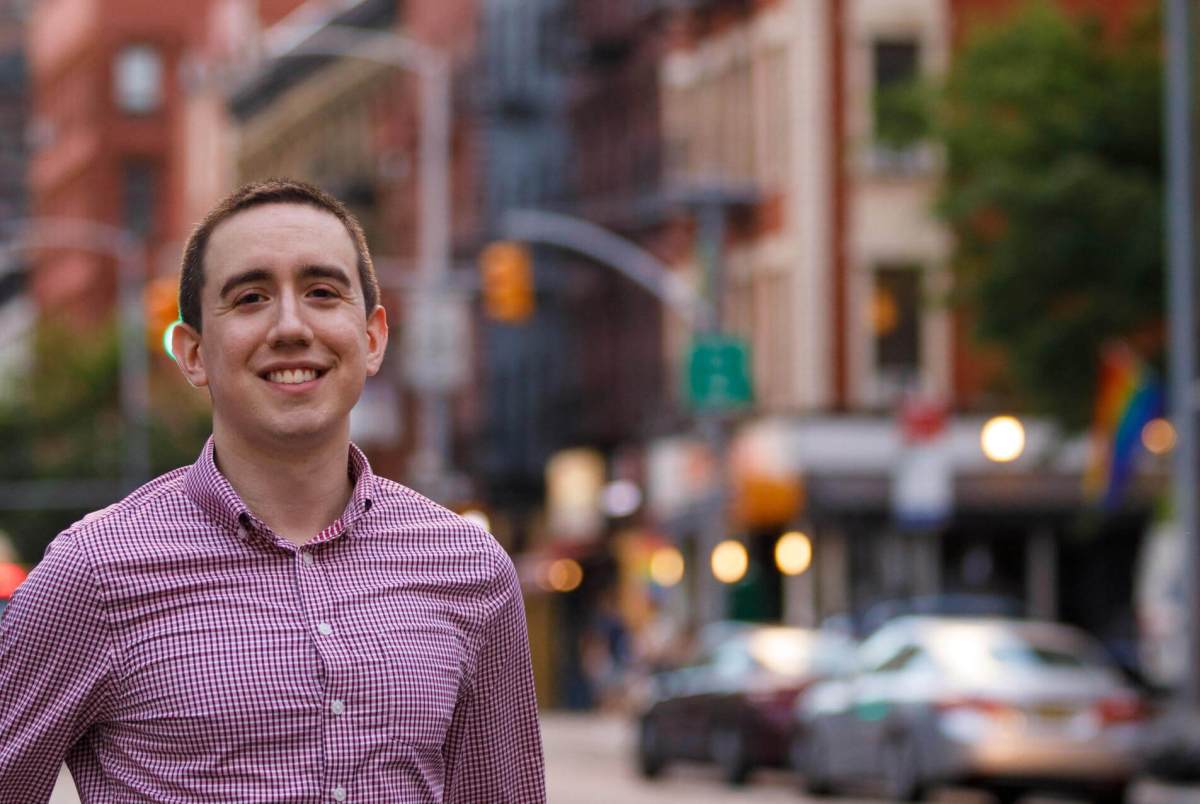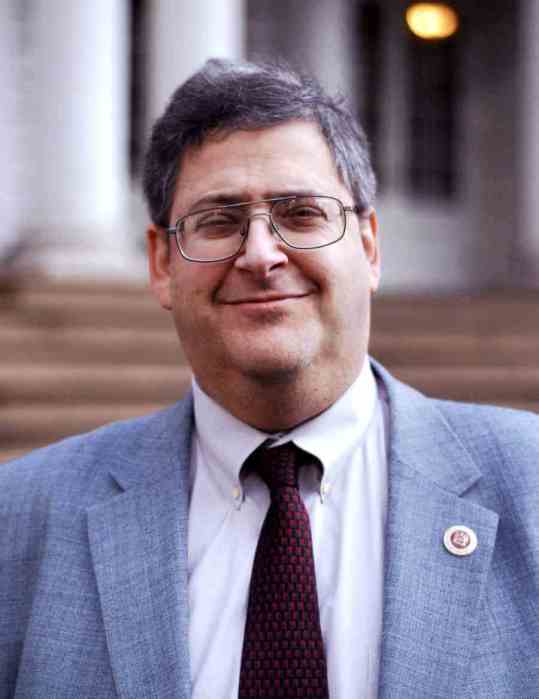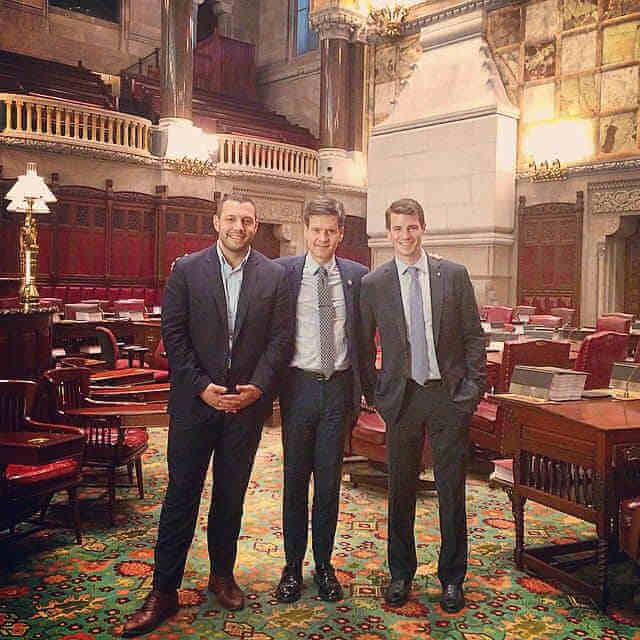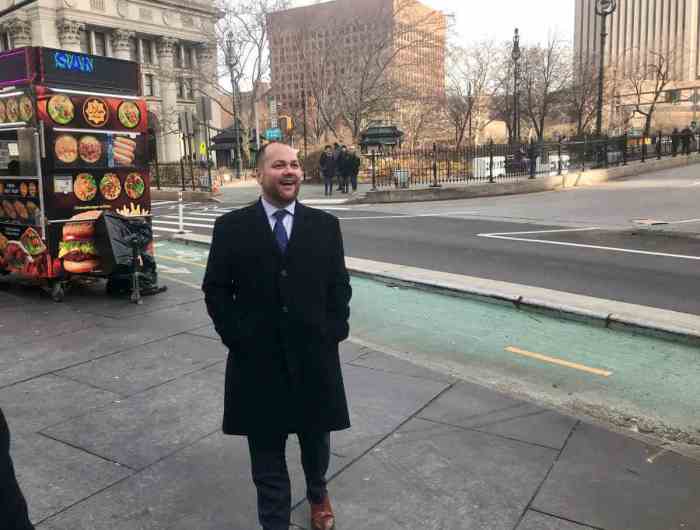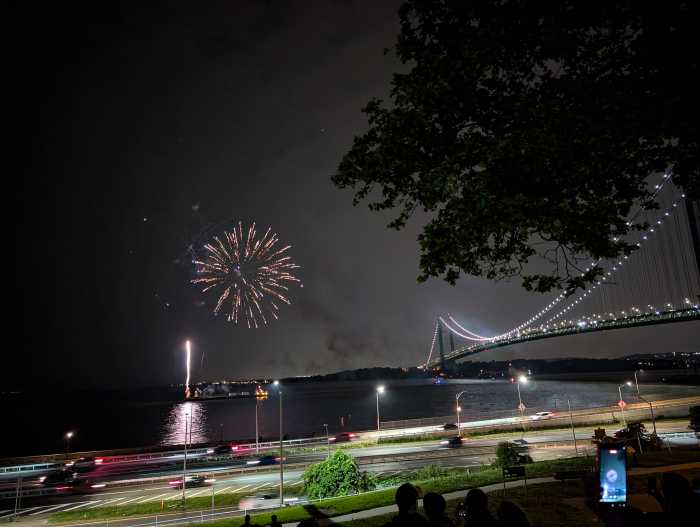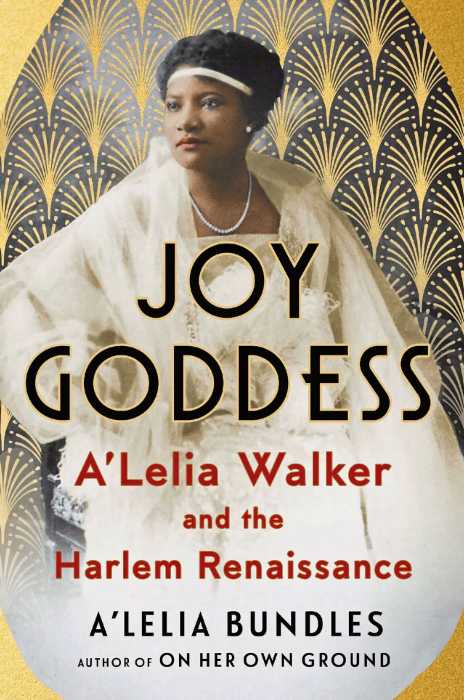Chris Sosa, an out gay City Council candidate hoping to replace term-limited lawmaker Ben Kallos in Manhattan’s East Side District 5, grew up far from the bright lights and hustle bustle of the district he hopes to represent next year.
The 2021 City Council hopeful came of age in a small town near Fredericksburg, Virginia, where he was homeschooled by his mother while his father juggled a construction job and attended college in the evenings until he became an accountant.
Sosa, meanwhile, set his sights on becoming a journalist. Starting at a community college, he later transferred to Boston’s Northeastern University. He kicked off a journalism career that featured gigs with multiple publications, but as he continued to watch the political landscape unfold he came to the realization that journalism was not necessarily the path he wanted to pursue after all.
“I found it hard for me to accept the role of being a bystander,” Sosa said during an interview with Gay City News. “I was concerned about a lot of the negative trends and forces happening throughout the country, and through that I became more of a commentator.”
To that end, Sosa shifted to the non-profit sphere and subsequently landed a job working in the New York State Legislature, where he first worked as
a communications director within the Democratic Caucus under the late State Senator José Peralta of Queens followed by Senator Luis Sepúlveda of the Bronx. He was part of the team that steered the New York State DREAM Act — which offers state-funded financial aid and scholarships for DREAMers — to passage and worked on a range of other issues, including bail reform and efforts to curtail solitary confinement.
“I found the experience very rewarding and moving, and it became increasingly clear to me the best way I could serve was to run for office myself,” Sosa explained.
Sosa, hoping to represent the people of Yorkville, Lenox Hill, Carnegie Hill, Roosevelt Island, Midtown East, Sutton Place, and El Barrio in East Harlem, has already picked a lane: He’s positioning himself on the left as a progressive candidate entering the 2021 election, stressing issues like the importance of police accountability, the full decriminalization of sex work, and the rejection of campaign cash from police unions, real estate developers, and other contributors who wield power.
To date, Sosa has pulled in 293 donations totaling $14,990, with 111 of those contributions flowing in since the beginning of last month. Of his total haul, 173 donations have come from New York State, 42 from his home state of Virginia, and 49 from Massachusetts.
Sosa describes racial justice as “the defining issue of our time” and, even in the aftermath of a city budget battle that did not translate into the size of NYPD cuts some advocates demanded, is adamant that there remains an opportunity to slash the NYPD’s massive budget further.
“I fully reject that it cannot be defunded,” Sosa said as he explained that he would have voted against the budget if he were in the City Council this year. “This was a temporary setback; this is not a loss. If I’m elected, I will fight for defunding.”
He added, “The people made a demand for the NYPD to be held accountable and for $1 billion to be defunded from that budget. That did not happen.”
Critics of the budget said the claim of $1 billion in cuts was disingenuous since at least half of that funding was shifted to other city agencies. And many advocates sought cuts of up to $3 billion.
Sosa said that being straightforward with voters is among the most important qualifications for the City Council. He implored voters to reject any candidate who refuses to offer clear and directs answers on important issues.
He hopes to be a part of an incoming City Council class that would not just maintain LGBTQ representation there, but expand and diversify it. The Council’s entire five-member LGBTQ Caucus consists of gay men, three of whom are white. Sosa aims to become a member of both the LGBTQ Caucus and the Black, Latino, and Asian Caucus, and he excitedly acknowledged the diverse field of queer candidates running next year during a cycle that could see the city elect its first non-binary and first transgender candidate as well as the first Black queer woman.
Sosa intends to focus on issues that are typically viewed from both a national and local lens. A supporter of Medicare For All, Sosa is well aware that the next batch of city lawmakers will be confronted with pivotal choices about healthcare — especially as the coronavirus pandemic continues to impact the nation. He is thinking outside the box about ways in which city lawmakers can at least push Medicare For All forward despite the Council’s limited jurisdictional reach.
“First of all, we can unilaterally outlaw the practice of Medicare and Medicaid refusal in hospitals,” he said. “As it stands, there are too many loopholes. New York City does a better job, but better isn’t good enough. Everyone should be covered.”
He added, “Another issue is access to quality healthcare. We have the money; it’s in the wrong places. A lot of our questions about how to solve problems in the city are about where our values are.”
He also tied the healthcare issue to LGBTQ community concerns, saying that the city must allocate more resources toward both preventative care, such as access to PrEP, and mental healthcare in light of the disparities that queer people encounter.
“The conversation doesn’t just need to be about rooting out discrimination,” Sosa said. “It also needs to be about creating an equitable society where, if you are born and you are trans or gay, you can expect to have the same health and wellness outcome.”
Among other important LGBTQ issues, Sosa is vowing to direct his attention to the patterns of violence facing trangender individuals, particularly trans women of color.
In order to get to the City Council, however, Sosa has to navigate his way through a wall of competition. According to the New York City Campaign Finance Board, five other candidates have filed to run for the same seat, including Billy Freeland, Joshua Kravitz, Rebecca Lamorte, Kim Moscaritolo, and Tricia Shimamura.
Sosa is playing up his work experience at the state level, claiming he is the only one in his race with experience passing laws in Albany. He’s also touting his progressive credentials as an early and unwavering supporter of the movement to take on police reform and redirect funds from the police department to necessary community resources.
“Often times we’re asked to choose between experience and values,” Sosa said. “I’m a candidate who comes with both of those.”
Sosa also plans to make his case to the people of his district by zeroing in on the hyperlocal issues that those Manhattan voters will be weighing when they go to the ballot box to choose their next city lawmaker.
Among his most pressing local priorities include making subway stations in his district wheelchair-accessible, pushing for an increase in affordable housing units, and bolstering small businesses.
“There are vacant storefronts where there shouldn’t be,” Sosa said. “We have predatory practices around rent and housing. We risk losing the culture of the Upper East Side if we don’t fight back against capitalistic impulses that would rather make money and rent out businesses to corporate interests.”
Another issue that has emerged in the district is sudden tree removal on Roosevelt Island by the Roosevelt Island Operating Corporation, which drew the ire of Sosa and local residents who felt left out of the discussion.
“I just thought it was absurd,” Sosa said. “We signed a petition against it and marched, and somehow it still happened.”
Whether he can have a chance to spark the change necessary to fix all of that is yet to be seen. Sosa will spend the next 10 months before the Democratic primary making the case that he should be the one representing the people of his district, and he’ll do that by articulating his original rationale for making the career shift from journalism to the public sector.
“I had what I believed to be solutions,” Sosa said. “And I could execute solutions, not just try to convince people to accept their situation.”
To sign up for the Gay City News email newsletter, visit gaycitynews.com/newsletter.

